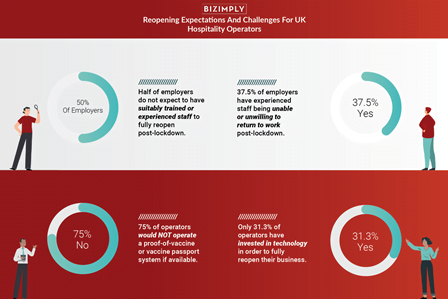Employees, rather than customers, are the biggest challenge facing hospitality businesses as the sector reopens. The majority of operators have experienced some team members refusing to return to work, according to new research by workforce management specialist Bizimply. Half of employers, 50%, say they lack enough trained or experienced staff to fully reopen.
The new Reopening Expectations and Challenges survey of employers confirms that many operators are struggling to find enough experienced staff. The findings tally with the views of trade body UKHospitality, which has flagged up the challenge in terms of both the total number of available employees, after many EU citizens left the UK to return to their home countries, as well as skills shortages in specific areas.
The Bizimply survey shows that the vast majority of operators, more than 90%, also expect some labour-intensive COVID prevention measures, such as table-only service and social distancing, to be a requirement beyond the 21 June date set by the Government.
In addition, hospitality businesses are showing an increased reluctance to “police” customers’ COVID status on behalf of the authorities. Only 25% of businesses said they would welcome a proof-of-vaccine or vaccine passport scheme, compared to 53% who said they supported a scheme pre-opening, in a Bizimply survey in February.
Bizimply CEO Conor Shaw says: “Our survey shows that the scale of the employment challenge facing the UK hospitality sector shouldn’t be underestimated. Most customers have been in a forgiving mood in the early weeks of reopening, but they won’t accept poor or slow service for too long.
“Equally, the realities of day-to-day trading with COVID measures in place has clearly hardened operators against the idea of a proof-of-vaccine scheme. The number who do not want to be required to check customers’ vaccine status has increased significantly since hospitality reopened.”
Findings from the Bizimply Reopening Expectations and Challenges survey show:
- Only 50% of hospitality employers have enough trained or experienced staff to fully reopen after lockdown. While the challenge is split equally between front-of-house and back-of-house, 25% said finding shift and team leaders was their biggest issue, and 22% highlighted chef recruitment;
- 3% have made changes to their recruitment and training procedures to address post-lockdown staff requirements;
- 75% believe Brexit has made recruitment more challenging;
- 5% have experienced some staff being unable or unwilling to return to work. The reasons given included concerns about personal safety, childcare issues; wanting more hours or higher pay, and those who have found other jobs or returned to their home countries;
- 3% of employers have employed new staff in order to reopen, and 25% have increased investment in staff training.
In addition, 31.3% of hospitality employers have already increased investment in technology in order to reopen. Shaw says: “This number investing in technology is likely to increase as more businesses reopen. Remote ordering and payment look set to be a permanent customer expectation.
“Additionally, workforce management systems can benefit both employers and employees, ensuring that staff availability is matched to the busiest times, but also helping to manage the flexibility that employees with childcare or educational commitments need.
“The combination of robust customer data through EPOS, and a clear understanding of the business in terms of labour requirements, provides a strong overview for operators, and also frees up GMs’ time to focus on delivering the all-important high standards of customer service that the current hospitality labour force challenges threaten.”
